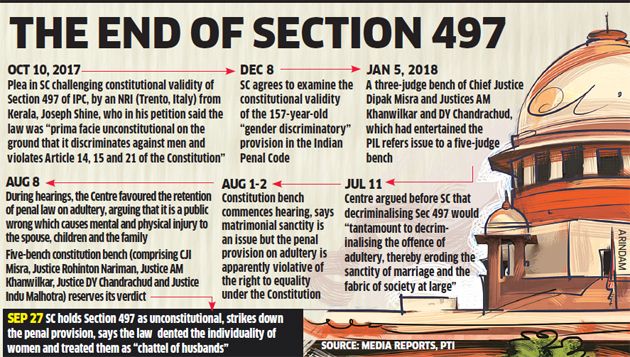Section 497: Adultery.
May 15, 2019 • 29 views

Adulteryisextramarital sexthat is considered objectionable on social, religious, moral, or legal grounds. Although thesexual activitiesthat constitute adultery vary, as well as the social, religious, and legal consequences, the concept exists in many cultures.
Punishments for adultery vary from place to place. Where adultery is illegal, the punishment varies from fines to caning in parts of Asia. There are fifteen countries in whichstoningis authorized as lawful punishment, although in recent times it has been legally enforced only in Iran and Somalia.
The termadulteryrefers to sexual acts between a married person and someone who is not that person's spouse. It may arise incriminal lawor infamily law. For instance, in the United Kingdom, adultery is not a criminal offense, but is aground for divorce,with the legal definition of adultery being "physical contact with an alien and unlawful organ"
Adultery law in India.

Section 497of theIndian Penal Codewas a section dealing withadultery. Not regular. Only a man who hasconsensual sexual intercoursewith the wife of another man without his consent can be punished under thisoffencein India. If someone "lives in adultery", the partner can file fordivorce. The law became defunct on 27 September 2018 by Supreme Court of India.The Supreme Court called the law unconstitutional because it "treats a husband as the master."
Section 497 read as follows:
Adultery.—
Whoever has sexual intercourse with a person who is and whom he knows or has reason to believe to be the wife of another man, without the consent or connivance of that man, such sexual intercourse not amounting to the offence of rape, is guilty of the offence of adultery, and shall be punished with imprisonment of either description for a term which may extend to five years, or with fine, or with both. In such case the wife shall not be punishable as anabettor.
{Abettor: a person who encourages or assists someone to do something wrong, in particular to commit a crime.}
It has been argued that the section violates two articles of the Constitution of India- Article 14 and Article 15.
Article 14 reads as follows: "The State shall not deny to any person equality before the law or the equal protection of the laws within the territory of India."
Article 15 reads as follows: "The State shall not discriminate against any citizen on grounds only of religion, race, caste, sex, and place of birth or any of them."

The law dictated that the woman could not be punished as an abettor. Instead, the man was considered to be a seducer.
It also did not allow women to file a complaint against an adulterous husband.
A man accused of adultery could be sent to a prison for a maximum of five years, made to pay a fine, or both.
